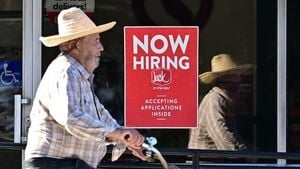The political chess match over congressional redistricting in the United States has reached a fever pitch, with Texas and California at the center of a rapidly escalating partisan battle. In the closing days of August 2025, lawmakers, governors, and party leaders on both sides of the aisle have taken extraordinary steps to redraw the electoral map—moves that many observers warn could threaten the very foundations of American democracy.
On August 29, 2025, Texas Governor Greg Abbott signed House Bill 4 into law, officially redrawing the state’s congressional districts. The bill, which passed the Texas House of Representatives on August 20 by an 88-52 margin and the Senate on August 23 by an 18-11 vote, was crafted at the behest of former President Donald Trump. According to reporting from CBS and other outlets, Trump had informed Texas Republican congressmen as early as July of his plan to have state legislatures redraw districts to deliver five additional U.S. House seats to Republicans. In a subsequent interview, Trump argued, “Republicans are entitled to five more congressional seats because other states with greater Democratic seats are a product of gerrymandering.”
The Texas Democrats, however, weren’t about to let the bill pass without a fight. In early August, fifty Democratic lawmakers fled the state, breaking quorum in both legislative chambers and delaying the bill’s progress. This dramatic maneuver—reminiscent of past standoffs in Texas politics—prompted Governor Abbott to issue arrest warrants and threaten the lawmakers with fines and the loss of their seats. Ultimately, enough Democrats returned on August 17 to restore the quorum, but not before racking up $9,354 in fines and facing ongoing legal threats from Texas Attorney General Ken Paxton, who has filed suit with the state’s Supreme Court.
But the saga didn’t end there. The day after the Texas Senate passed HB 4, a coalition of Texas voters, backed by the National Redistricting Foundation, filed a federal lawsuit. The complaint alleges that the new district maps amount to racial gerrymandering and intentional vote dilution, violating the Fourteenth and Fifteenth Amendments as well as the Voting Rights Act. As the case heads to a special three-judge panel with the possibility of a direct appeal to the U.S. Supreme Court, the stakes for Texas—and for the nation—couldn’t be higher. Currently, Republicans control 25 of Texas’s 37 occupied congressional seats, with one vacant seat previously held by a Democrat. The GOP’s razor-thin majority in the U.S. House—just seven seats—means every district is crucial.
Not to be outmaneuvered, California Democrats have launched their own counteroffensive. In late August, the California legislature passed a constitutional amendment and related legislation, both on party-line supermajority votes, to temporarily suspend the state’s independent redistricting commission. Instead, lawmakers themselves would redraw congressional districts in an effort to flip five Republican-held seats—effectively neutralizing the Texas GOP’s gains. Governor Gavin Newsom, the chief architect of this strategy, signed the measures immediately, setting the stage for voters to weigh in on the new maps as Proposition 50 in a special state election on November 4, 2025.
“California will not be a bystander to Trump’s power grab,” declared Assembly Speaker Robert Rivas as Newsom signed the legislation, according to the Los Angeles Times. “We will not stand by while the House is hijacked by authoritarianism.” State Senator Sabrina Cervantes echoed the sentiment, warning, “If we let Trump get away with this rigging of elections, then we may not have free and fair elections in the future.”
The rhetoric in Sacramento has been fiery, with both sides invoking high stakes and even classic movie lines. As one columnist observed, the debates bore “Wizard of Oz” echoes: “Pay no attention to that man behind the curtain,” some Democrats seemed to say, as they justified their own partisan redraw in response to Texas’s actions. Republicans, for their part, decried the hypocrisy of attacking Texas Governor Abbott’s gerrymandering while pursuing a similar strategy in California. Assembly Minority Leader James Gallagher, a Republican, broke with his party’s national leader, stating, “He is wrong to do so. Let me repeat. He is wrong… Where does it end?” Gallagher went on to argue, “What I don’t hear from the other side is, ‘My governor is wrong.’”
According to Strength In Numbers, a data-driven political newsletter, the tit-for-tat spiral of partisan gerrymandering is fueling an “anti-democratic whirlpool.” The newsletter’s August 31 roundup noted that support for partisan gerrymandering is rising—not just among Republicans, but increasingly among Democrats as well. A recent Strength In Numbers/Verasight poll found that “support for democracy and fair elections is high—indeed, people think it’s more important than their party winning,” but that “Democrats have become much more likely to support partisan gerrymandering if it counters Republican rigging.” The poll also revealed a growing public awareness that there is no federal requirement for impartial map drawing, with an overwhelming plurality now viewing partisan gerrymandering as a problem.
The data reflect a larger national trend: As each side accuses the other of undermining democracy, both are increasingly willing to bend or break the rules to secure political advantage. “Once the rigging starts, it becomes a matter of political survival to play the same game as your opponent,” warned Strength In Numbers. “This is what makes the whirlpool so dangerous. Once you’re pulled in, there are few ways out. Democracy suffers as a result.”
This arms race has not gone unnoticed by the public or by political scientists. Lee Drutman, author of “Breaking the Two-Party Doom Loop,” has long warned that zero-sum politics could lead to a cycle of partisan rigging and delegitimization, ultimately undermining democracy itself. The most recent polling and legislative maneuvers in Texas and California seem to bear out his concerns.
Yet amid the hyperbole and hardball tactics, there are some voices calling for reform. Both Republicans like Gallagher and Democrats in California have publicly supported the idea of outlawing gerrymandering nationwide and turning redistricting over to independent commissions. However, as Gallagher himself admitted, “that won’t happen in the foreseeable future.”
Meanwhile, the courts will have their say, especially as challenges to Texas’s HB 4 proceed through the federal judiciary. The outcome may set important precedents for how far states can go in drawing districts to favor one party or another, and whether voter-approved safeguards—like California’s independent commission—can be so easily set aside.
As the November special election in California approaches and the legal battles in Texas intensify, the question remains: Can the U.S. pull itself out of this whirlpool of partisan mapmaking, or is the nation destined for ever-deeper polarization and democratic erosion? For now, the only certainty is that the redistricting wars are far from over.




